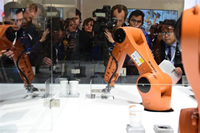China's Midea buys nearly half of German robotics firm Kuka
 The Star: Chinese appliances giant Midea moved a step closer to fulfilling its ambition to acquire German industrial robotics firm Kuka with two weekend deals raising its stake to nearly a majority.
The Star: Chinese appliances giant Midea moved a step closer to fulfilling its ambition to acquire German industrial robotics firm Kuka with two weekend deals raising its stake to nearly a majority.
Two of Kuka’s biggest German shareholders – technology company Voith and entrepreneur Friedhelm Loh – said they had decided to take up Midea’s offer of €115 (RM512) per share and sell their stakes.
German news agency DPA reported that Voith had agreed to sell its stake of 25.1% for €1.2bil (RM5.34bil).
And Loh told the business daily Handelsblatt he had decided to sell his stake of 10% for nearly €500mil (RM2.22bil).
Combined with its existing holding of 13.5% in Kuka, the two purchases mean Midea now holds 48.5%, or not far from the outright majority, in the Augsburg-based robot builder. Cont'd...
Comments (0)
This post does not have any comments. Be the first to leave a comment below.
Featured Product

